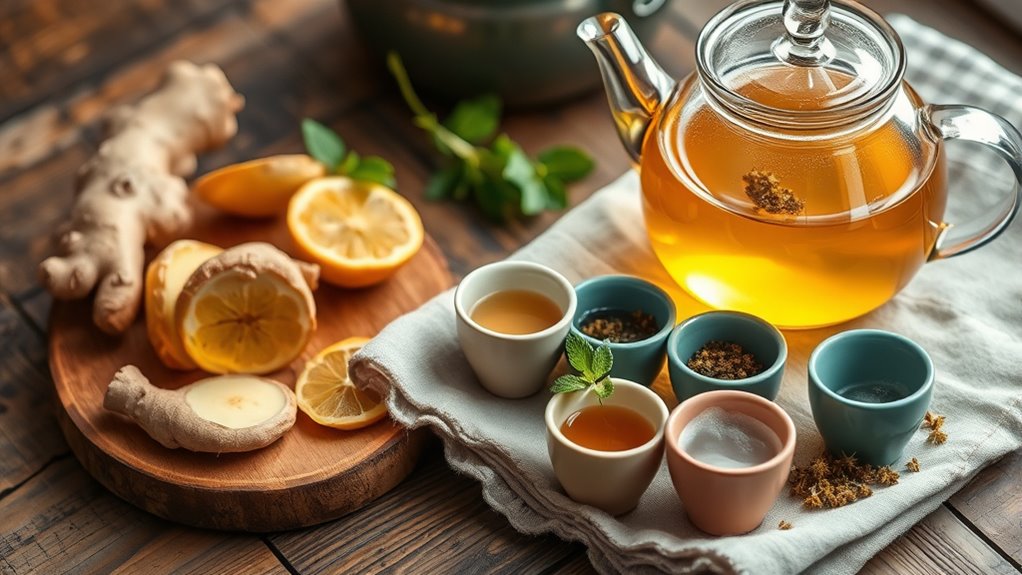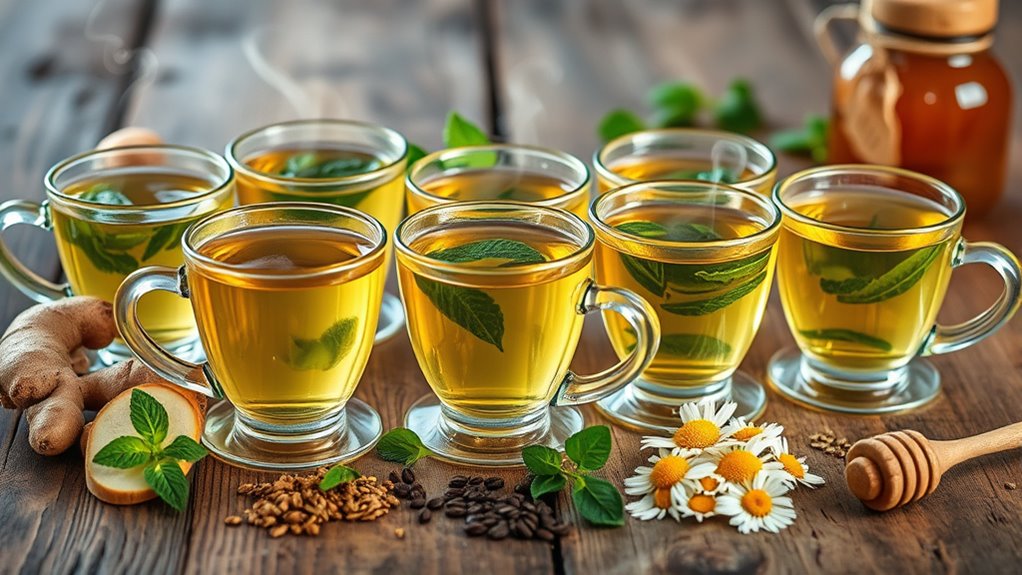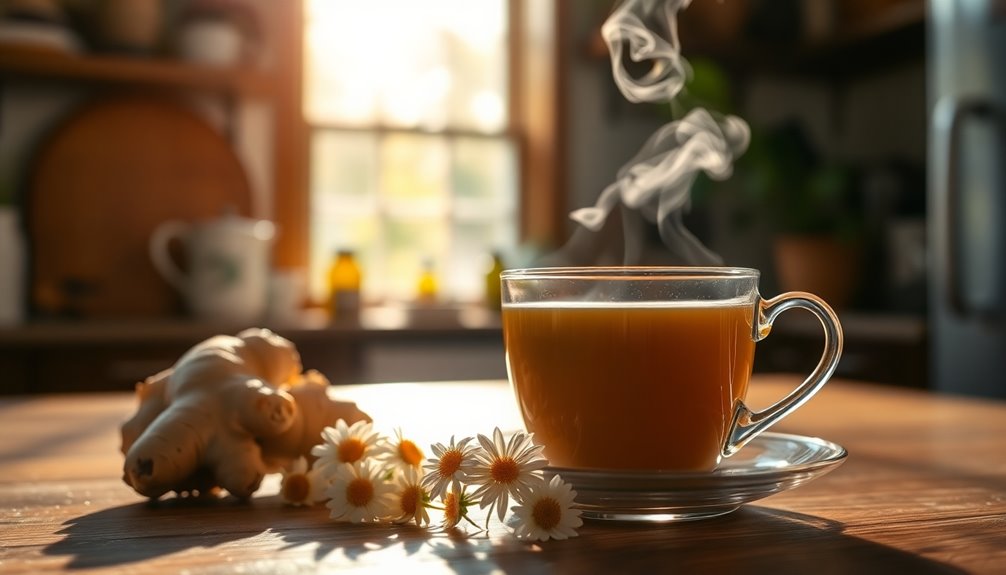If you’re experiencing common digestive woes, herbal teas can provide natural relief. Peppermint tea relaxes muscles and eases bloating, while ginger helps reduce nausea and inflammation. Chamomile soothes stomach inflammation and calms nerves, and fennel seeds promote gas relief and digestion. Lemon balm also supports relaxation and gut comfort. Incorporating these teas into your routine can ease discomfort naturally. Keep exploring to discover how these herbal remedies can help you feel better quickly.
Key Takeaways
- Peppermint tea relaxes gastrointestinal muscles, easing indigestion and bloating.
- Ginger tea reduces nausea, inflammation, and supports overall digestion.
- Chamomile tea calms nerves and soothes stomach inflammation, alleviating indigestion.
- Fennel seed tea relaxes gut muscles and helps release trapped gas, reducing bloating.
- Regular herbal tea intake complements a healthy diet to prevent common digestive issues.

If you often experience indigestion or bloating, you might find relief in a simple cup of digestive woes tea. These herbal remedies have been used for centuries to soothe upset stomachs and promote better digestion. Incorporating herbal teas into your routine can be a gentle, natural way to ease discomfort without relying on medication. Alongside drinking tea, paying attention to dietary tips can make a significant difference in managing your digestive health. Avoid heavy, greasy foods and opt for lighter, fiber-rich meals that support your gut. Smaller, more frequent servings can prevent overloading your digestive system and reduce bloating.
Herbal remedies like peppermint, ginger, chamomile, and fennel are particularly popular for their digestive benefits. Peppermint tea, for instance, contains menthol which relaxes the muscles of your gastrointestinal tract, easing spasms and cramping. Ginger has anti-inflammatory properties that help stimulate digestion and reduce nausea. Chamomile not only calms your nerves but also soothes inflammation in your stomach lining, making it effective against indigestion. Fennel seeds, often brewed into tea, contain compounds that relax the muscles in your gut and help release trapped gas, reducing bloating. These herbs work synergistically to calm your digestive system and alleviate common discomforts.
Peppermint, ginger, chamomile, and fennel herbs soothe digestion and reduce bloating naturally.
When preparing your digestive woes tea, keep it simple. Steep the herbs for about 5 to 10 minutes to extract their active compounds. Drinking it warm can enhance its soothing effects and promote relaxation. Consistency is key—making these teas part of your daily routine can help prevent symptoms from becoming severe. Additionally, combining herbal remedies with dietary tips like staying hydrated, avoiding carbonated drinks, and chewing your food thoroughly can optimize your digestive health. Sleep quality also plays a vital role in maintaining healthy digestion and minimizing discomfort.
Monitoring your body’s response is essential. If certain herbal teas seem to worsen your symptoms, discontinue use and consult a healthcare professional. Remember, herbal remedies are supportive measures and should complement a balanced diet and healthy lifestyle. Incorporate plenty of fruits, vegetables, and whole grains into your meals, and limit processed foods and sugar, which can upset your stomach and cause bloating. Regular physical activity also encourages healthy digestion and reduces stress, a common trigger for digestive issues.
Frequently Asked Questions
Can Digestive Tea Replace Medical Treatment for Serious Conditions?
You shouldn’t rely on digestive tea to replace medical treatment for serious conditions. While tea safety and herbal interactions are generally mild, they can still cause issues or interfere with medications. Always consult your healthcare provider before using herbal teas for serious issues, as they won’t address underlying causes or provide the necessary medical intervention. Tea can complement treatment but isn’t a substitute for professional care.
Are There Any Side Effects From Drinking Digestive Tea Regularly?
While sipping your digestive tea, you might enjoy its soothing benefits, but watch out for subtle signs of tea allergy or caffeine concerns. Regular intake could lead to mild side effects like stomach discomfort or sleep disturbances, especially if you’re sensitive. If you notice reactions, it’s wise to moderate consumption or choose caffeine-free options. Staying mindful helps you enjoy the positives without unintended discomfort.
Which Types of Tea Are Best for Specific Digestive Issues?
You should choose herbal blends tailored to your specific digestive issues. For indigestion, ginger or peppermint teas work well; for bloating, chamomile helps soothe your stomach. Be mindful of caffeine content—opt for caffeine-free options if you’re sensitive or experiencing stomach upset. These herbal blends naturally support digestion, so you can enjoy relief without worries about side effects or caffeine jitters.
How Much Tea Should I Drink to See Results?
When considering tea consumption for digestive relief, aim for about 2-3 cups daily. Consistent daily intake helps your body benefit from the tea’s soothing properties, but don’t overdo it to avoid potential side effects like stomach upset or dehydration. Listen to your body, and if you notice any discomfort, reduce your intake. Regular, moderate consumption is key to seeing positive results over time.
Is Digestive Tea Suitable for Children or Pregnant Women?
This question’s as important as life itself! Digestive tea isn’t always suitable for children or pregnant women. You should prioritize children safety and consider pregnancy considerations before offering any herbal tea. Some ingredients might cause allergies or harm the developing baby. Always consult a healthcare provider first to guarantee safety. Remember, natural doesn’t always mean safe—so be cautious and seek professional advice to protect your loved ones.
Conclusion
Next time your stomach’s acting up, try sipping on one of these soothing teas. Imagine Sarah, who struggled with frequent bloating, finding relief after a cup of ginger tea daily. Just like her, you might discover that a simple, natural remedy can make a big difference. Don’t hesitate to give these teas a try—your gut will thank you for it. Remember, gentle, natural solutions often work best for those pesky digestive woes.










